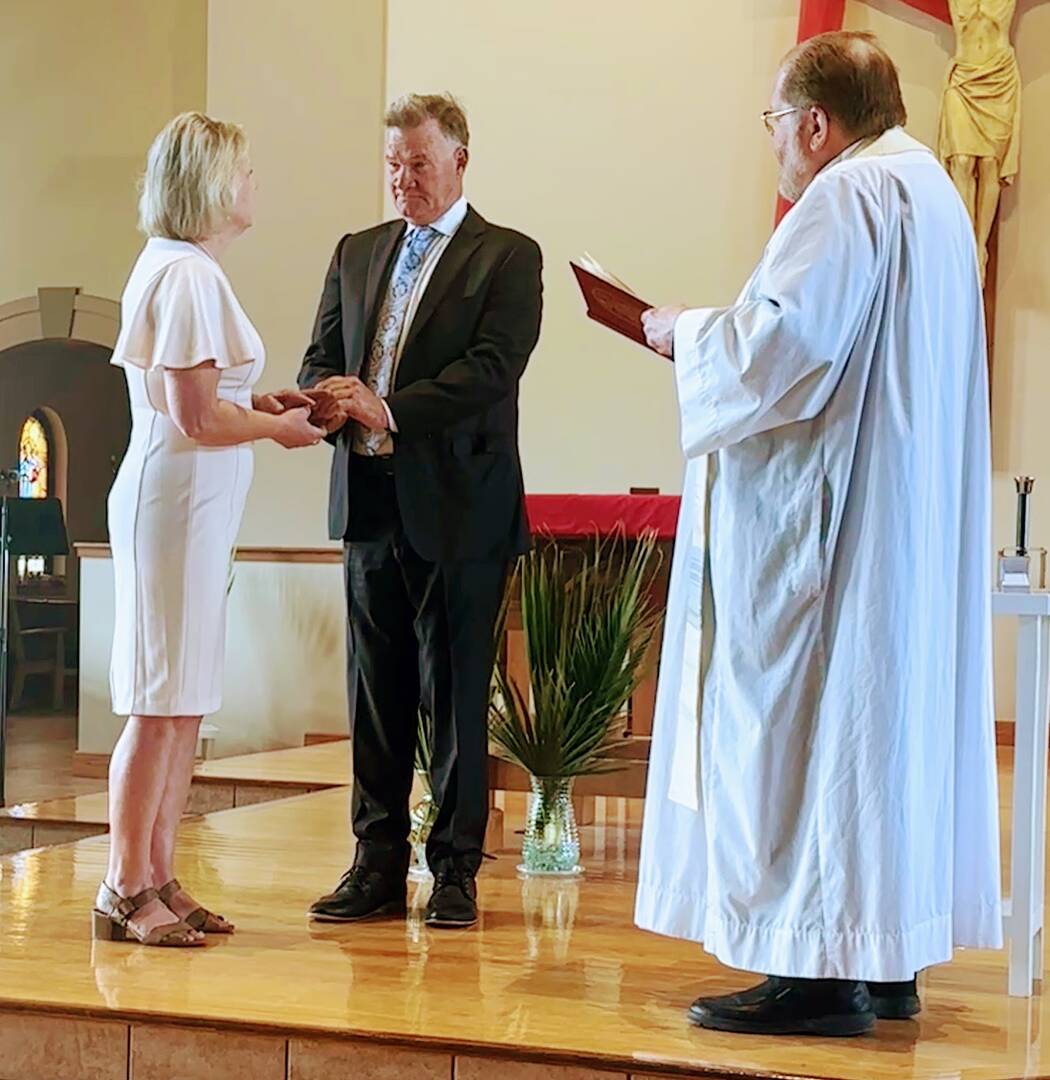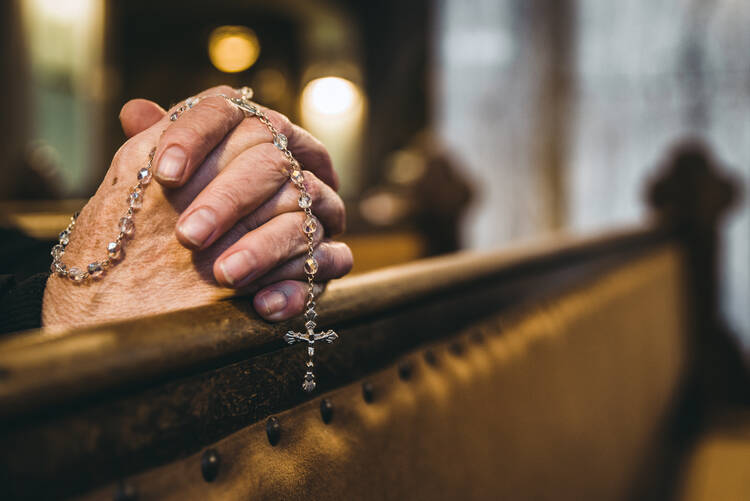The carpet was threadbare, the pews worn, in this cavernous Catholic church. Yellow tape blocked off an area of seating where the ceiling plaster had given way. My husband and I were attending a funeral, and it was there that we felt a still, persistent sense of a message from God to us. Let me back up.
My parents were devoted Catholics, raising six rowdy kids and scraping up enough to send us all to Catholic school through 12th grade. As a child, I loved God, but I had swirling questions about him too, questions that were not always welcome. In first grade, I asked Sister Julia, “If Jesus were all-powerful, why didn’t he come down off the cross and save himself?” Instead of an answer, I received a shaming directive. She told me to go stand in the coat closet and hold my arms out from my side for as long as I could, so I might experience just a taste of what Jesus did for me.
My frustration grew throughout my Catholic education and morphed into a teenage chip on my shoulder, particularly when it came to the prescribed experiences of parochial education. The mission trip where the longtime leader yelled at our group because we hadn’t responded as emotionally as his prior groups of teens. The T.E.C. weekends, during which I listened with skepticism to classmates pouring out publicly how they were going to change their ways and become better Catholics.
But at 16, I felt my heart soften a bit when I performed in the musical “Godspell.” I sang a solo, “By My Side.” This song follows a scene in which Marigold, who represents a woman condemned to be stoned, is saved by Jesus, who tells her: “You may go. Do not sin again.”
Marigold, taking Jesus’s words to heart, pleads to follow him, singing: “Where are you going? Where are you going? Can you take me with you? For my hand is cold, and needs warmth. Where are you going?”
On opening night, I sang these words and felt hot tears spring up, out of a well of longing for a real relationship with Jesus, one where I could follow him, unencumbered by what I, as a teenager, saw as all the rule-based religious rituals being taught.
Sister Liz, a beautiful, softhearted nun, watched the performance and reached out to me after it, with an invitation to talk. She asked what the words meant to me, and why I became teary. Then she listened, and gently affirmed that what I experienced was real, coming from an encounter with the divine. The years have not lessened the impact of her caring or her words to me.
Taking Another Path
When I graduated from high school, I married my Presbyterian boyfriend and shut the door on Catholicism. For three years, we visited churches of every denomination and landed, with a toddler in tow, at a welcoming, friendly Protestant church. We found the teaching accessible, the music outstanding, and the children’s education program engaging and fun for our young son. Soon we were volunteering, making friends and becoming fully enmeshed with the mantra we so often heard—a Christian life was about “life together.”
For 35 years, we served, led ministries and thoroughly enjoyed attending this church. As a young mother, I bought a Bible and learned how to study it. I discovered that prayer could be a conversation rather than a recitation, and I marveled at others who could spontaneously pray aloud. I raised my arms in praise during a moving worship song, and I could also laugh in wonder at moments when God’s timing and movement were unmistakable. My faith grew like a spring flower; and in a church that was young, expanding and full of energy, we raised our family.
But in 2019, my beloved husband died of brain cancer, and suddenly, the youth and energy, the big smiles and warm hugs, and the overall positivity of this church felt discordant with my grief and new widowhood. It was my gutting sadness that could not find a home within the culture of this church, and a pervasive sense of unease descended when I tried to attend. One of the contemporary worship songs we sang at this time repeated the lyrics: “You’re never gonna let, you’re never gonna let me down.” I wanted to scream when we sang that song, because of course we will feel let down by God. God is mystery. His thoughts are not our thoughts, nor his ways. And things like brain tumors that refuse to respond to treatment or prayers howled in the dark without answer can be experienced as God letting us down.
Our Next Steps
Time passed. Covid-19 took root. Our friendly church began to change. The leadership structure of our church became divided over a refusal to allow full inclusion of L.G.B.T.Q. people. I slipped away quietly and permanently, and turned more fully to a few of my favorite writers, who just happened to be Catholic—James Martin, S.J., Richard Rohr, O.F.M., Joyce Rupp, O.S.M. While their good words kept my soul afloat, I was deeply pained not to be a part of a thriving church community anymore.
Then I met a wonderful man who had been raised in a Catholic home very similar to my own. We fell in love and married, bringing our collective grief to the table but also our hopes and dreams for a happy and meaningful “fourth quarter” together. This would include finding a shared faith.
And that was the message from God at the funeral at that aforementioned cavernous church with the threadbare carpet. It was there that we both felt the entwining roots of our spiritual DNA, the ties to our departed parents, our relatives and our Catholic heritage, going back centuries. We both envisioned our parents attending daily Mass while we were growing up. We pictured them lighting candles, asking saints to intercede, praying the rosary. I watched people receive the Eucharist, and tears streamed as if I was seeing it for the first time. And as in childhood, the questions bubbled: Could God be doing a new thing, after all these years? Could I see Catholicism with more openheartedness and curiosity than I had in my youth? Could embracing my Catholic faith be the way forward at this stage of life and in a new marriage?

With wonderment, we began to attend Mass regularly, with the attitude that if we were going to explore this, we were going to be all in. I joined a weekly Bible study, asking so many questions of the faith-filled women I now call my dear friends. I learned the rosary, and in the final days of my mother’s life, I said it with her repeatedly. It brought us both great comfort. I took part in confession—with my Bible study women graciously showing me the ropes after my 45-year absence. In addition, my husband went through a lengthy annulment process with our brilliant and trusted parish priest, and we had a convalidation ceremony, where we said, “I do,” not only to each other but also to the solid ground of a shared, rekindled faith.
Perhaps it is the hard-won wisdom that comes with age, but the very rituals and practices I once scorned and believed were hindering my relationship with Jesus are the same rituals and practices that now usher me into his presence, time and time again. The solemnity, the sacrament, the history and its people—all speak to me now, perhaps in what has been all along my mother tongue, and that of my husband.
The solo that I sang at 16, with its pleading question of Jesus, “Where are you going?” can be assuredly answered with, “He’s been here all along.” How can we then keep from singing?








